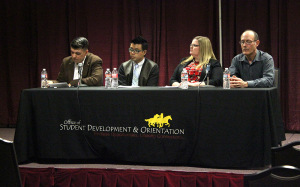
In the wake of President Barack Obama’s State of the Union Address where he spoke of human rights and the 2014 protests over the deaths of several unarmed African Americans during police interventions, the Student Development and Orientation held a panel discussion Tuesday night led by faculty and staff entitled Justice, Injustice, Progress & Protest.
Seth Newton, graduate assistant for student development and orientation, said, “The idea behind the panel was to get a dialogue going to help empower students to help keep America moving forward and holding students accountable for the progress of the movement.”
Newton said with racial tensions on the rise in America he wanted to empower the students to get involved in their own way.
“I really wanted to help build awareness for the things going on in our country,” Newton said. “Because I believe if you know about the things that are happening you can contribute to the cause. If you don’t stand for anything, you’ll fall for something.”
The panel discussed topics ranging from structural racism to injustice in the criminal justice system to get students actively involved through discussion.
“The panel helps me reach this goal by actually creating dialogue for our community,” Newton said. “Actually having those conversations will help students be more aware of the history that’s being created in their midsts.”
The Panelists
Nathan Jun, coordinator and associate professor of philosophy, helped define exactly what “human rights” are.
“Human rights is a term that gets bandied around a lot,” Jun said. “People seem to not truly know what it means, but what it does mean is what humans are entitled to through their given rights.”
Jun said students would need to take the lead in establishing more dialogue on human rights.
“I feel like there are a lot of important and complicated issues,” Jun said. “The university and students should be more involved in discussing the issues at-large. The only way to get that accomplished is by the students taking the lead on it.”
Cammie Dean, director of student development and orientation, officiated the panel but gave her own input at the end of the panel discussion.
“We always plan Human Rights Week right after Martin Luther King Jr. Day because as a student body we don’t get to celebrate the importance due to the day off,” Dean said. “I don’t think it is enough to just be proud of history because there is still work to do.”
Dean said students care and are aware, but the problem is now speaking off of social media and into action.
“I think it’s a topic that students care about and I think they are more informed than they were a few years ago, but the struggle is to take the rights and wrongs out of the virtual fields,” Dean said. “As those protest die down, the next step is to put our opinions into action and I don’t think people have jumped out to that yet.”
Dean, much like Jun, added that tough conversations need to happen more often around campus.
“I think that conversations like this are things that we should be having more often around campus,” Dean said. “There has been a lot of talk coming out of the Student Development and Orientation Office about having more of these talks. We think students are wanting to go even if they aren’t showing up yet.”
Kevin Bazner, assistant director of student development and orientation, said he believes that the school stands behind social injustices, but their needs to be more conversation.
“It’s one of the values of the institution and we don’t promote it as much as we should,” Bazner said. “WeConnect is the next big event to spur conversations like these.”
The Students
There were few students involved in the panel discussion, but those that were there thought had differing views.
Marco Torres, psychology senior, said, “I thought it was kind of biased. I noticed they focused mainly on showing the white cops as the bad guys like in Crash. As a liberal institution, we should have shown both sides.”
Something a couple of the students agreed on was that public institutions, such as schools, play an important role in racial profiling among children.
“Education plays a key role in racism,” Torres said. “I agree with much that the teacher said about how institutions can be a breeding ground for negative actions. Teachers have to be willing to advocate for both sides.”
Jacob Warren, economics freshman, advocated for students of color.
“The easiest way to break the racism trend is to make friends and stop thinking about color so much,” Warren said. “It’s about the person as a whole not the color of their skin.”
The norm for the US is to think about the racial tensions, but for our overseas constituents human rights aren’t as big of a push.
“Human rights aren’t [as much of] a focus in the Caribbean,” Renatta Graham, respiratory freshman, said. “I was interested in, not so much the statistics, but the rights we have in America and what comes with it.”
Updated 1/30/2015: This article was updated to more accurately reflect Renatta Graham’s statement that human rights are simply talked about less in the Caribbean than in the United States.














